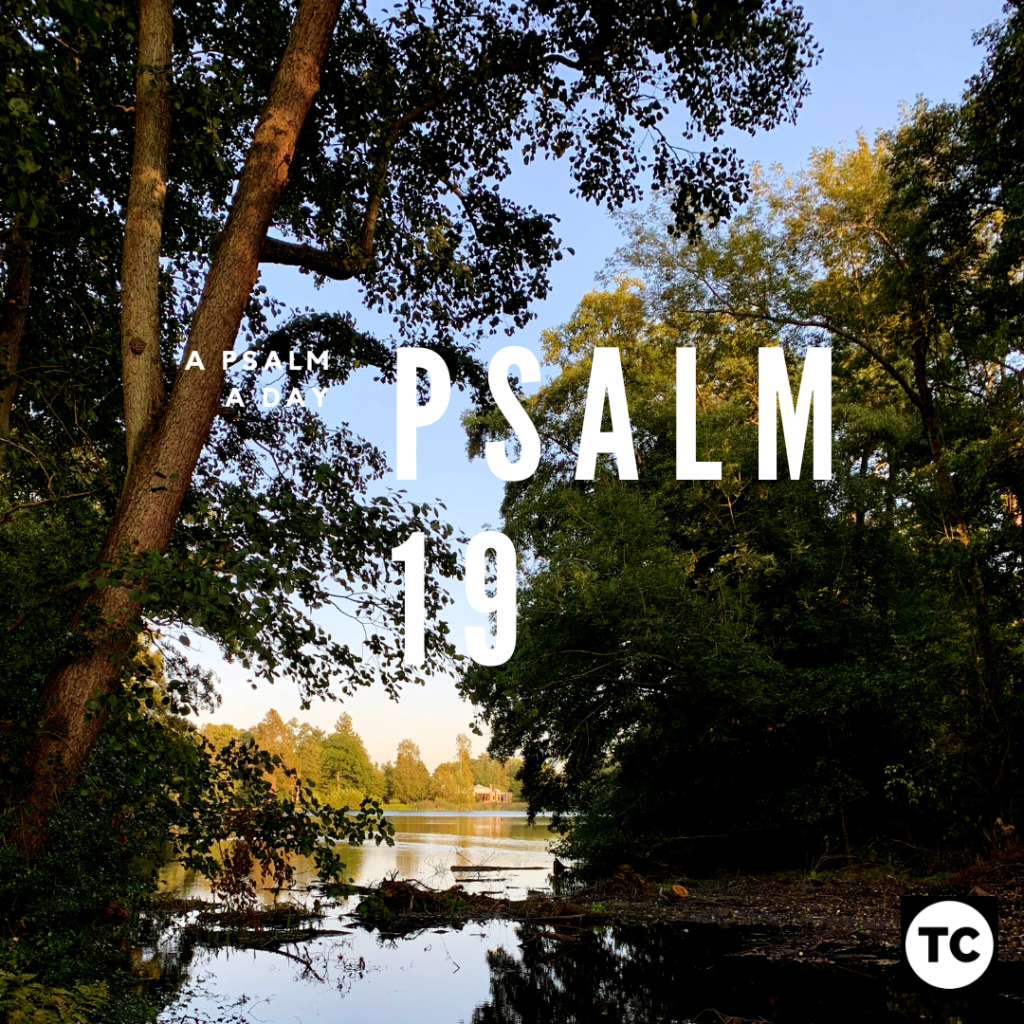For September 2022, I’m trying to read and reflect – briefly – on a Psalm each day. I’ll read the Psalm, pray, and then ponder a few questions:
- What is this Psalm about?
- What does this Psalm teach about God?
- How does this Psalm connect to God’s people today?
I’ll close the post with a simple prayer, trying to draw the themes together.

Nineteen days into September, here is Psalm 19:
1 The heavens declare the glory of God;
the skies proclaim the work of his hands.
2 Day after day they pour forth speech;
night after night they reveal knowledge.
3 They have no speech, they use no words;
no sound is heard from them.
4 Yet their voice goes out into all the earth,
their words to the ends of the world.
In the heavens God has pitched a tent for the sun.
5 It is like a bridegroom coming out of his chamber,
like a champion rejoicing to run his course.
6 It rises at one end of the heavens
and makes its circuit to the other;
nothing is deprived of its warmth.
7 The law of the Lord is perfect,
refreshing the soul.
The statutes of the Lord are trustworthy,
making wise the simple.
8 The precepts of the Lord are right,
giving joy to the heart.
The commands of the Lord are radiant,
giving light to the eyes.
9 The fear of the Lord is pure,
enduring forever.
The decrees of the Lord are firm,
and all of them are righteous.
10 They are more precious than gold,
than much pure gold;
they are sweeter than honey,
than honey from the honeycomb.
11 By them your servant is warned;
in keeping them there is great reward.
12 But who can discern their own errors?
Forgive my hidden faults.
13 Keep your servant also from willful sins;
may they not rule over me.
Then I will be blameless,
innocent of great transgression.
14 May these words of my mouth and this meditation of my heart
be pleasing in your sight,
Lord, my Rock and my Redeemer.
What is this Psalm about?
This Psalm combines three great strands of what it means to be in or consider a relationship with God. Firstly, verses 1-6, what the theologians call ‘natural theology’ – the idea that creation itself can teach us something about God. More than that, that creation itself praises God. The description of the sun in v5-6 is beautiful – poetry echoing reality. Secondly, verses 7-11, we hear of ‘the Law of the Lord’, what Christians today might call the Bible (Old Testament Jews would refer, I believe, to Torah, to the Pentateuch, the five books of Moses). Relationship with God might be hinted at in the praise of creation, but it only really makes sense in the light of revelation. Thirdly and finally, verses 12-14, a prayer and meditation by the Psalmist, which would be a good pray for anyone to pray.
What does this Psalm teach about God?
With three huge topics, as noted above, Psalm 19 has a lot in it. God is portrayed as creator (v1), Law-giver (v7-12) and Rock and Redeemer (v14 – with other titles and attributes visible too. One of the most powerful subtexts, though, I think in Psalm 19, are the second part of some of the verses, particularly in the middle section, which underline the benefits of following God’s way – in this, ‘joy’, ‘refreshment’, etc, I think we see again the gracious goodness of God.
How does this Psalm connect to God’s people today?
Echoing the three strands from the beginning of my reflection, I think that Psalm 19 encourages us and challenges us to care for and learn from creation. Secondly, it forces us to be take seriously God’s word – and particularly the radical idea that obedience to it might possibly be best for us. Finally, it is a reminder to pray, to speak honestly with and to God, asking him for help and praising him.
A prayer from Psalm 19
Lord, creation declares your glory, and your word is trustworthy and true. You are wonderful! May these words of my mouth and this meditation of my heart be pleasing in your sight, Lord, my Rock and my Redeemer. Amen.
Leave a Reply